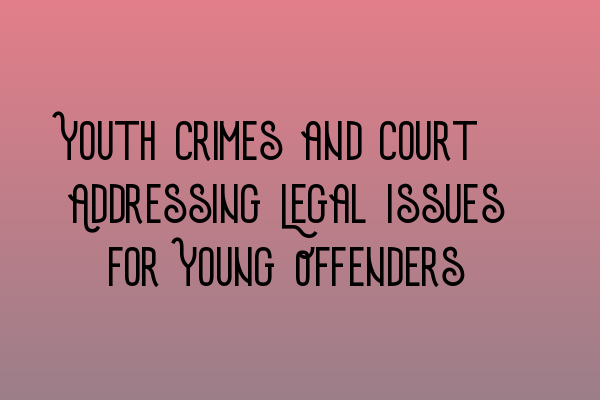Youth Crimes and Court: Addressing Legal Issues for Young Offenders
As a solicitor specializing in criminal law and practice, it is my duty to help address legal issues faced by young offenders. The criminal justice system can be overwhelming, especially for youth who are not familiar with the intricacies of the law. In this blog post, I will explore the legal challenges faced by young offenders and how the court navigates these situations.
Understanding Youth Crimes
Young offenders are individuals under the age of 18 who commit a crime. It is crucial to treat these cases differently from adult crimes, considering the unique factors that influence youth behavior. By recognizing the complexities associated with adolescence, the court system aims to strike a balance between accountability and rehabilitation.
When handling youth crimes, it is important to work with solicitors who specialize in this area. Our team at SQE Criminal Law & Practice Law UK has the expertise to guide young offenders through the legal process and ensure their rights are protected.
The Role of the Youth Court
In the United Kingdom, young offenders are typically dealt with in the youth court. This specialized court is designed to address the specific needs and circumstances of young people facing criminal charges. The primary objective of the youth court is not only to punish but also to rehabilitate young offenders and prevent reoffending.
During court proceedings, the magistrate or judge takes into account the age, maturity, and personal circumstances of the young offender. This approach helps to tailor the sentencing and intervention plans to address the underlying causes of the criminal behavior.
If you are interested in understanding the intricacies of the court process and the specific legal considerations for youth crimes, I recommend reading our related article: SQE 1 Practice Exam Questions. This article provides valuable insights into legal examination questions relevant to youth crime cases.
Diversionary Programs and Alternatives to Custody
The youth court prioritizes diversionary programs and alternatives to custody whenever appropriate. There are various options available to address the root causes of the offending behavior, such as counseling, community service, or restorative justice practices.
Diversionary programs serve as an opportunity for young offenders to receive support, guidance, and rehabilitation outside the formal court setting. These programs aim to prevent reoffending and allow for the development of prosocial skills and behavior. Additionally, they offer young people a chance to make amends for their actions and engage positively with their communities.
If you want to explore the different diversionary programs available for young offenders, I recommend reading our comprehensive guide: SQE 2 Preparation Courses. This article highlights the importance of such programs and provides information on how they contribute to the overall justice system.
Long-Term Support and Rehabilitation
Young offenders require ongoing support and rehabilitation to improve their chances of leading a law-abiding life. After the court proceedings, it is crucial to address the underlying issues that contribute to criminal behavior.
At SQE Criminal Law & Practice Law UK, we understand the significance of long-term support in preventing reoffending. Our team of dedicated solicitors works closely with young offenders to establish personalized rehabilitation plans. We collaborate with various professionals, including therapists, counselors, and social workers, to ensure a holistic approach to their well-being.
If you are interested in learning more about the overall process of youth rehabilitation and long-term support, visit our related article: SQE 1 Practice Mocks FLK1 FLK2. This article provides valuable insights into the mock assessment tests that help measure the progress of young offenders towards successful rehabilitation.
Conclusion
Addressing legal issues for young offenders requires a comprehensive understanding of their unique circumstances. The youth court plays a pivotal role in ensuring a balanced approach that combines accountability and rehabilitation.
If you or someone you know is facing legal issues as a young offender, it is imperative to seek legal assistance from solicitors experienced in youth crime cases. At SQE Criminal Law & Practice Law UK, we are committed to providing dedicated and professional support throughout the legal process.
For more information on youth crimes, court procedures, or related areas of law, please visit our website and explore our range of articles and resources, such as: SRA SQE Exam Dates. We strive to empower young offenders and guide them towards a positive and law-abiding future.
Remember, everyone deserves a chance to learn, grow, and be reintegrated into society with the right legal guidance and support.
